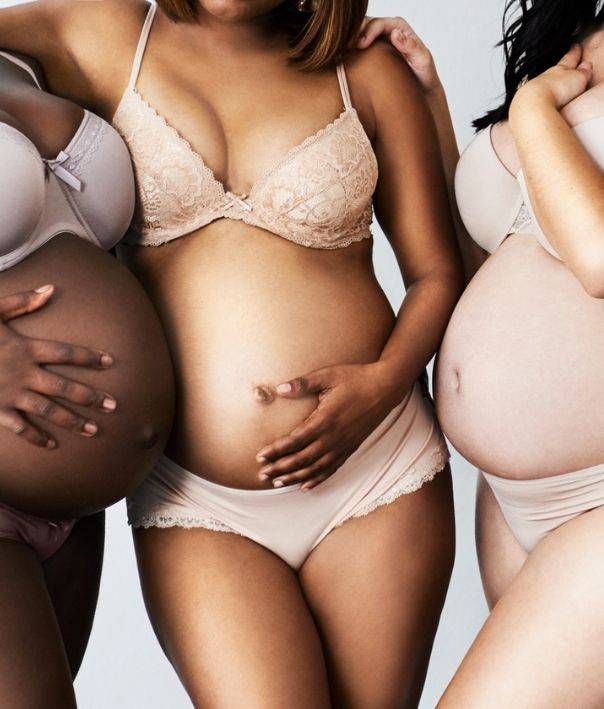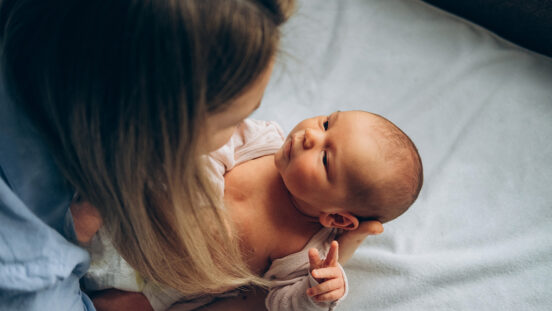Common skin changes during pregnancy and the skincare ingredients to avoid
A few tweaks to your existing skincare routine might be necessary.
By Evette Hess, esmi Skin Minerals Founder
The mantra of “being kind to your skin” becomes more important than ever while you are pregnant and breastfeeding. There are so many hormones changing, pigmentation, acne, not to mention the stress of having a new baby and the sleepless nights.
There are some lucky mums-to-be out there that experience the best skin of their lives during pregnancy. Unfortunately, it’s not always the case! You may experience pregnancy-related changes in your skin that are more challenging to deal with.
In my first pregnancy I expected a beautiful pregnancy glow (as advertised) but instead I got extremely dry flaky skin which resulted in dull looking skin and no glow in sight.
This handy guide explains ingredients to avoid and pregnancy approved alternatives for common skin changes during pregnancy.
Hormonal acne – Breaking out around the chin and jaw? Acne in these areas can be linked to hormonal changes.
Melasma – Sometimes called the ‘mask of pregnancy’ melasma is hyperpigmentation (skin discolouration) that can appear on your forehead, nose, and cheeks.
Dryness – Dryness can make fine lines and wrinkles more pronounced.
If you have any pre-existing conditions, like eczema or rosacea, these can get worse during pregnancy.
You’ll need to manage these skin concerns while you’re expecting (and during breastfeeding) with skincare products that are safe during pregnancy.

Evette Hess is a Gold Coast mum and the founder of esmi Skin Minerals – a vegan, cruelty-free and Australian made makeup and skincare range.
Skincare Ingredients To Swap During Pregnancy
Safe skincare for pregnant women means avoiding certain ingredients – a few tweaks to your existing routine might be necessary.
Carefully read all the labels on the skincare products you’re currently using. You’ll want to press pause on applying the following ingredients during pregnancy:
AVOID: Retinols, or any vitamin A derivatives (Anti-ageing)
Retinol, retin-A, retinoic acid, and tretinoin shouldn’t be used if you’re expecting.
These anti-ageing ingredients are all derived from Vitamin A, which is an effective vitamin for your skin but is problematic during pregnancy.
Excessive amounts of Vitamin A has been found to interfere with fetal development. No matter the amount you include in your routine, the safest approach is to avoid retinol, or any vitamin A derivatives entirely.

If you have any pre-existing conditions, like eczema or rosacea, these can get worse during pregnancy.
What Are The Pregnancy Safe Anti-ageing Alternatives?
Thankfully, temporarily giving up Vitamin A doesn’t have to mean abandoning your anti-ageing routine.
Alternative ingredients that are pregnancy safe and offer effective anti-ageing properties are easy to include in your pregnancy skincare routine. You may already be using some!
Vitamin C – Vitamin C is your antioxidant go-to for a pregnancy skincare routine. An effective all-rounder, it helps repair environmental damage, stimulate collagen synthesis, and brighten skin.
Peptides – Peptides are a type of protein that helps preserve and boost collagen levels, smooth fine lines, and minimise the appearance of pores.
Omega Fatty Acids – Omega 3, omega 6 and omega 9 play a role in maintaining youthful, healthy-looking skin. They deliver positive changes in skin hydration, scaling, and roughness.
Pregnancy safe products we recommend for an anti-ageing routine
The Uncomplicated Cleanser plus Anti-Ageing
Golden Anti-Ageing Serum (evening)
Anti-Ageing Repair Gel Booster Mask
These products are also safe to use during breastfeeding.
AVOID: Salicylic acid (Acne)
Salicylic acid is a heavy hitter for treating acne. Its deep exfoliating action clears blocked pores to minimise bacteria and reduce congestion. When it comes to skincare for pregnant women though, it’s not on the ‘safe’ list in high doses so it’s best to skip this ingredient entirely.
What Are The Pregnancy Safe Skincare Ingredients To Treat Acne?
Take your pick of pregnancy safe ingredients to manage breakouts while you’re expecting.
Lactic acid – A sensitive skin hero, lactic acid is the gentler, yet effective, exfoliator of the acids group.
Glycolic acid – Glycolic acid is an exfoliant that naturally occurs in plants including sugar cane and citrus fruits.
Fruit enzymes – Enzymes found in some fruits and berries break down keratin proteins attached to dead cells to help target congestion.
Bentonite clay and activated charcoal – Detoxify and refine congested skin and help control oil.
Polynesian sand – An effective physical exfoliator for oily skin types, Polynesian sand helps to gently unblock pores for clearer skin.
Breakout prone skin will also benefit from pregnancy safe skincare products that deliver deep hydration, such as hyaluronic acid and niacinamide (Vitamin B3), and plant-based oils that help regulate sebum production.
Pregnancy safe products we recommend to help manage breakouts
The Uncomplicated Cleanser plus Anti-Redness
Anti-Redness Minty Green Smoothie
Fresh Sea And Salty Sand facial exfoliant
Detoxifying Exfoliating Charcoal Serum
Soft Skin Refining Charcoal Clay Booster Mask
These products are also safe to use during breastfeeding.

During pregnancy it is best to avoid products which contain salicylic acid.
AVOID: Hydroquinone (Hyperpigmentation)
A depigmenting agent, hydroquinone is used to lighten darkened areas of skin by suppressing the formation of melanin in the skin. Research has shown hydroquinone to be problematic during pregnancy, so it’s one to avoid.
What are the pregnancy safe skincare ingredients to treat hyperpigmentation?
These powerful natural skin lighteners are safe to include in your pregnancy skin care products
Vitamin C – Vitamin C helps lighten patches of pigmentation without leaving your skin barrier compromised – no dryness, peeling or flaking as a result. It also gives the complexion a bright, radiant appearance.
Kakadu Plum – Kakadu Plum is believed to be the world’s most potent source of natural Vitamin C making it an excellent ingredient to help diminish the appearance of dark spots.
Bearberry – Bearberry Leaf extract is a natural skin lightener that works by helping to reduce melanin production.
Liquorice – A powerful brightening antioxidant, liquorice is high in anti-inflammatories – making it great for post-inflammatory pigmentation and redness/scarring after breakouts.
Pregnancy safe products we recommend to help manage hyperpigmentation
The Uncomplicated Cleanser plus Brightening
Sunrise Skin Energising Acai Duo
Bouncy Brightening Silky Booster Mask
These products are also safe to use during breastfeeding.

In many cases, it takes a while for your skin to return to “normal” after your baby is born or breastfeeding has ceased. In fact, it might not go back to what it was before. This is totally normal!
Skin changes and this is just another part of your skin journey. Once your hormones have settled post-breastfeeding this is a great time to start looking at your skin once more, getting to know it again and treating it accordingly with the correct ingredients.
This blog post originally appeared on Esmi Skin Minerals.




